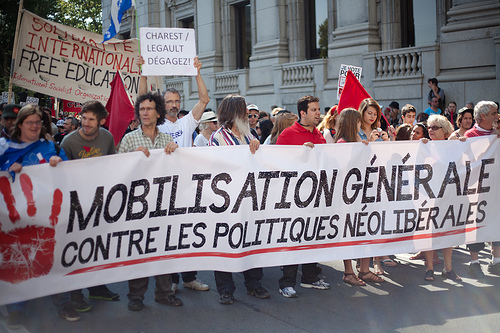Tens of thousands of demonstrators took to the streets here yesterday for the monthly protest march of Quebec’s student movement. The movement has organized monster, monthly marches on the 22nd of each month since March of this year.
The march was an impressive display of militancy and determination just 12 days before a provincial election to take place on September 4. Some members of the radical CLASSE student association said that 100,000 people took part. A “professional counter” employed by the state broadcasting network Radio Canada gave a figure of 12,500. The broadcaster has routinely downplayed or not reported at all the size of past marches.
To this writer’s “unprofessional” eye, the march exceeded 50,000. It wound its way through downtown Montreal for two hours. On any straight stretch of roadway, one quite long, only a fraction of the march length was visible.
The march was called by the radical CLASSE student association and the Coalition Against the Privatization and Tarification of Public Services. It was co-sponsored or supported by the student associations FEUQ and FECQ, political parties, several trade unions, and the pro-student community organizations that have mushroomed in neighbourhoods throughout the city and province in recent months.
Trainloads and busloads of students poured into the city for the action from the city of Sherbrooke (75 km to the east) and from other urban centers around Montreal. According to CLASSE, some 90,000 junior college (CEGEP) students went on strike for the day in Montreal.
The Montreal daily La Presse reports ten CEGEPs were shut down. At CEGEP Bois-de-Boulogne, early morning pickets by students and community supporters frustrated the effort of college administrators to keep the institution open for the day.
Striking CEGEP students whose school year was suspended by Bill 78 back in May and was to resume on varying dates this month have voted during the past several weeks to suspend their strike. They are awaiting the outcome of the provincial election on September 4 before deciding if the strike will resume.
Limited election polls in the past week suggest that the governing Liberals are headed to defeat, but it’s too early yet to make any definitive predictions. There was a mood of cautious optimism throughout the march that an incoming Parti québécois government will have no choice but to carry through on its promise to repeal Law 12 and postpone any consideration of imposing a lesser tuition fee hike.
Omnipresent on the march were the key issues of the student movement — no hike in university tuition fees and repeal of the anti-democratic Bill 78 (become Law 12 when passed into law last May).
Banners, placards and red-colored squares in all shapes and sizes voiced these demands. Some placards addressed the issue of amnesty for the more than 3,000 people who face civil or criminal charges for taking part in student protests since the outset of the strike.
The march also contained many broad, anti-capitalist themes. The lead banner read Mobilisation générale contre les politiques néo-libérales (Broad Mobilization Against Neo-Liberalism).
Speeches at the beginning of the march, in the center of Montreal’s business district, voiced strong defense of social programs and opposition to attacks on these by the present Liberal Party government. Speakers included representatives of the Quebec Federation of Nurses and the Federation of Quebec Women. At the end of the march, in the historic district along the city’s riverfront, speeches by student activists were stridently anti-capitalist and hailed class struggle as a motor force of progressive social change. The assembled crowd there numbered in the thousands.
Small numbers of union banners were present on the march. They included the nurses federation and several post-secondary education unions affiliated to the CSN federation. There were few or no union banners from the FTQ federation and its affiliates, nor from the CSQ, the largest teachers federation in the province. Leaders of these and other union federations have said that they won’t take part in pro-student marches that risk to be declared “illegal” by the police under Law 12. Organizers of this one disobeyed Law 12 by refusing to seek police permission to stage it. One arrest was reported.
Political parties joined the march. By far the largest contingent was that of the left-wing party Québec solidaire. Hundreds of its members, including many of its candidates in the present election, marched together. Scores of placards of the party, sporting its election theme, “Stand up!” were scattered throughout the march.
A contingent of members of the International Socialist Organization from the neighbouring state of Vermont and further afield in the United States joined the march with a banner reading, “Solidarity with Quebec students.” For several months, the group has helped bring representatives of CLASSE to speak to students across the United States. More such speaking tours are planned. Speaking tours of Quebec student leaders in English speaking Canada are planned for the coming months.
The CLASSE association says it is engaged in a long-term battle for free and quality education, health and other vital social services. It wants a government that has social justice and protection and enhancement of the natural environment as its watchword. As its name states, CLASSE wants to forge unity of students, workers, Indigenous peoples and others in this fight.
CLASSE spokesperson Jeanne Reynolds told assembled media at the beginning of today’s march, “Regardless of what happens in the coming weeks, we will continue to mobilize and we must continue to question where we are headed as a society. We must continue to talk of education because even if this present tuition hike is withdrawn, all the threats of the commercialization of education will still be there.
“September 4 [the date of the Quebec election] is less important than September 5. From that date, we will continue to fight as we have done for the past six months until our ultimate victory.”



